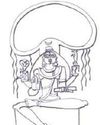
Today our topic is Moksha. It is a new word and not a very pleasant one. Moksha means release. There are four motivations viz. doing duties (Dharma), acquiring wealth (Artha), enjoying (Kama), and then giving up (Moksha). These are standard thoughts in Indian philosophy. One may carry out the other things but the release is also there. The body cannot last, the mind also cannot last. That is the point we have to prepare. Technically in yoga it means gradual withdrawal of the senses, of the sense objects, which naturally mean that the objects are given up. But the cravings of the senses are still there.
Then, at the higher level, we have the mind withdrawal also, and a state comes when there is a complete release from all material things which happens in the case of the traditional Yogi.
Esta historia es de la edición May 2023 de Yoga and Total Health.
Comience su prueba gratuita de Magzter GOLD de 7 días para acceder a miles de historias premium seleccionadas y a más de 9,000 revistas y periódicos.
Ya eres suscriptor ? Conectar
Esta historia es de la edición May 2023 de Yoga and Total Health.
Comience su prueba gratuita de Magzter GOLD de 7 días para acceder a miles de historias premium seleccionadas y a más de 9,000 revistas y periódicos.
Ya eres suscriptor? Conectar

Moringa Flowers
Edible flowers? Yes! Ayurveda mentions many edible flowers. One of them is the Moringa flower.

You Gain Some, You Lose Some
Recently, we the Chennaites, got the opportunity to get blessings from His Sharada Peetam.

A Healthy Body
An incident from Swami Vivekananda's Life

A Man Himself is Responsible for His Deeds
Renouncing doer-ship

The Unstructured Drama of Life
Go for the silent roles

Positive Thinking and Meditation
A life-raft for seniors

Soul Connects
The Yoga Institute’s Reach Out Camp

The Wood Wide Web
As a kid, Suzanne Simard grew up in the rainforests of British Columbia and she normally spent her summers visiting forests around and exploring them along with her family, which included a curious dog named Jiggs.

More About Dharma and Duty
Considering One's Own Background (Part 2)

Devaluing Your Value
The lure of more